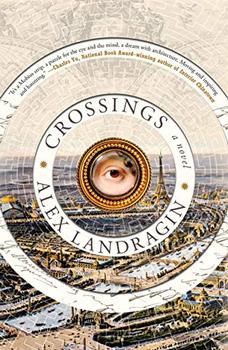Book Club Discussion Questions
In a book club? Subscribe to our Book Club Newsletter and get our best book club books of 2025!
For supplemental discussion material see our Beyond the Book article, Metempsychosis, Transmigration and Mesmerism and our BookBrowse Review of Crossings.
Please be aware that this discussion guide will contain spoilers!
- Right from the opening line, appropriation is a major theme in Crossings. How does the
novel explore this theme? And to what end?
- The conceit of the crossing allows the reader to inhabit the bodies of characters of a
variety of cultures, sexualities, genders, classes, and races. What does the novel have to
say about identity?
- Discuss how Crossings challenges the reader's ability to distinguish the real from the fake,
and why this might be important.
- Crossings traverses 150 years and seven lifetimes in under four hundred pages. Discuss how
language, form, and genre are used to drive the narrative forward across this timeframe.
- "I am Alula. I am the one who remembers. You are Koahu. You are the one who forgets."
Memory and forgetting are major themes. Discuss how past and present relate in the novel.
Crossings is preoccupied with history. What kind of history is the book interested in, and why?
- Alula believes Koahu forgets his previous lives when he crosses, except in his dreams.
And yet if he cannot remember his previous selves, what claim does he have to being the
person she says he is? How does the novel suggest identity might be possible without
memory?
- If Alula decides on the spur of the moment to cross with Joubert as a desperate act of
love, what does she learn about love as a result of her decision?
- What role do morality and ethics play in Crossings? Is there a moral to the novel?
- What is the nature of the relationship between Balthazar and Artopoulos? And is
Artopoulos's final judgment of Balthazar—"You are evil!"—justified?
- The narrator of "City of Ghosts" claims to fall in love with Madeleine even though he
disbelieves everything she believes. Is it truly possible to fall in love with someone whose
belief system is so different to one's own that one questions their capacity to reason?
- Crossings is, in fact, two books, with two beginnings, middles, and ends. They're quite
different from each other, but they consist of exactly the same words. What is the effect
of this structure? Which is the better book? Could a third sequence be envisaged?
- Crossings may be a fantasy concept, but what corollaries does it have in our real lives?
What religion or other belief system does crossing most resemble?
Unless otherwise stated, this discussion guide is reprinted with the permission of St. Martin's Griffin.
Any page references refer to a USA edition of the book, usually the trade paperback version, and may vary in other editions.
